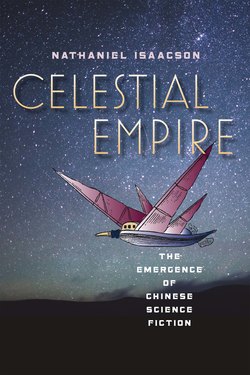Celestial Empire

Реклама. ООО «ЛитРес», ИНН: 7719571260.
Оглавление
Nathaniel Isaacson. Celestial Empire
Отрывок из книги
CELESTIAL EMPIRE
The Emergence of Chinese Science Fiction
.....
The shift that distinguished the nineteenth century from previous eras was the sense that Western science and technology were indeed superior and that an adequate response demanded their popularization. The increasingly undeniable superiority of Western science at the close of the nineteenth century15 and the social implications of Darwinian theories of evolution brought challenges not only to Chinese conceptions of time and their place in world, but also to the Chinese framework of cosmology and nature.16 A combination of factors contributed to an increasingly widening scientific and technological gap between Britain and France on the one hand and China on the other that emerged during the eighteenth century. This included Jesuit resistance to adopt Newtonian calculus into their mathematical repertoire, an information gap between Jesuits in China and their European counterparts, the diminished status of the Jesuit order in the eyes of the papacy, and an inward turn beginning during the Kangxi reign (Elman 2006, 169, 183–189). “The Newtonian revolution in physics and engineering in Britain and France was not transmitted to China until the Taiping Rebellion (1850–1864) via French engineers at the Fuzhou Shipyard and British machine workers at the Jiangnan Arsenal” (244).17 A simultaneous Jesuit “muddling” of Newtonian physics and a Qing turn inward prevented China from adapting the engineering and technological expertise that sparked off the industrial revolution in Europe.
At the same time, the eighteenth century saw a restoration of Chinese mathematical and medical classics and a diminished interest in foreign bodies of knowledge. In a familiar process of empire building, Qing rulers oversaw efforts to gather and assimilate the historical, literary, and scientific achievements of previous dynasties. For the Qing, this effort often entailed a process of reconstruction and extraction that attempted to discern Han and pre-Han texts from their Song dynasty neo-Confucian scholarly traditions (Elman 2006, 225–280). These restorative efforts eventually led to the Yangwu, or Foreign Affairs Movement, the argument that European technologies and scientific methods were derived from Chinese origins, a pervasive intellectual trend that saw its strongest expression in the years between 1860 and 1895.18 This argument played an important role both as a balm for China’s defeat at the hands of European powers and, as some have argued, as an explanation for why it was acceptable to adopt so-called foreign concepts. This term was at the center of an intellectual and political paradox—in order to survive as a nation, China would have to give up the epistemological system that defined it; or, in other words, in order to repel their Western aggressors, China would have to adopt a substantial portion of the Western worldview. Arguments in favor of the importation of Western technologies often had recourse to this notion, though it is unclear whether this was out of real conviction or political expediency. This idea arose as a response to a series of agonizing defeats at the hands of European colonial aggression, and in the words of Theodore Huters, “the relationship between domestic and foreign learning has been one of the most enduring issues in determining the intellectual direction of modern China” (Huters 2005, 23).
.....